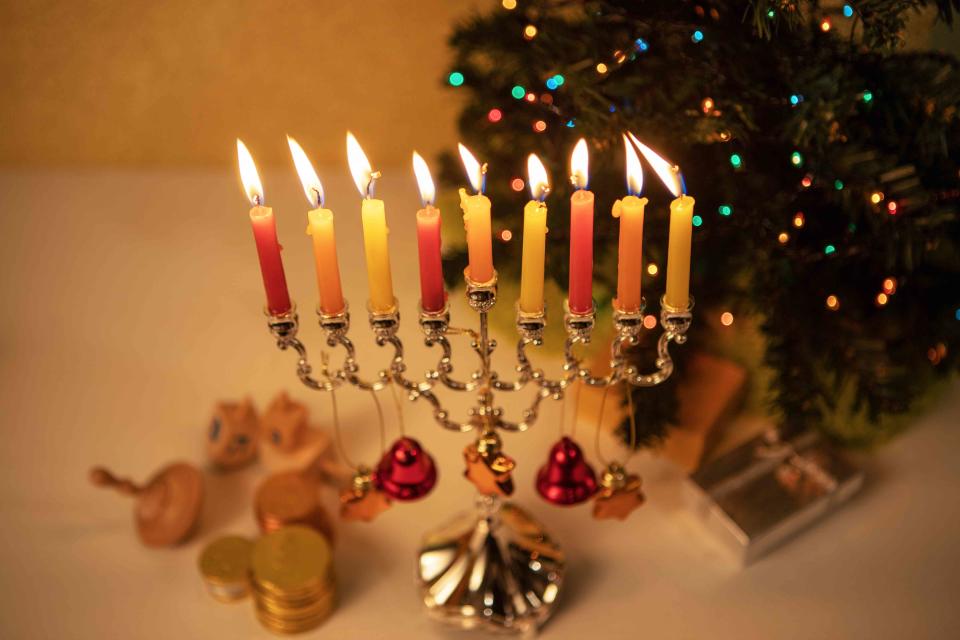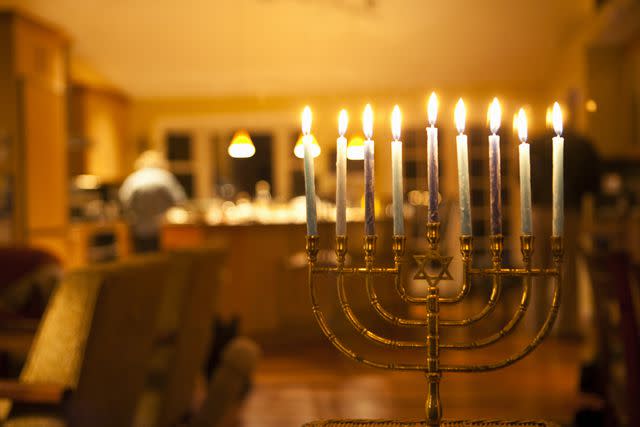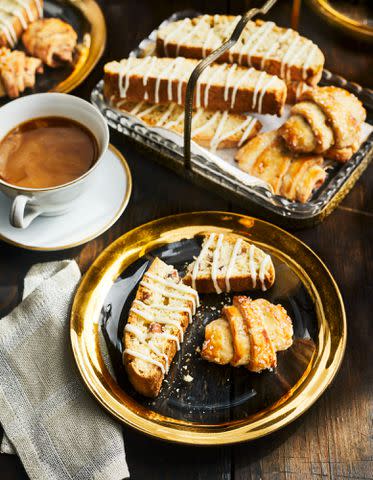What’s The Difference Between Christmas And Hanukkah?
Though often grouped together as winter holidays, Christmas and Hanukkah aren't the same.

annuoka/Getty
It's the holiday season at last, and the temperatures are slowly but surely dropping, the festive decorations are multiplying by the day, and right around the corner are Christmas and Hanukkah. But let's pause. Though often lumped together as winter holidays, Christmas and Hanukkah are dissimilar in both their religious and cultural significance, and they actually have a pretty complicated relationship.
While Christmas is a given massive cultural significance in America, this is not the case for Hanukkah. We’re not just talking about the banks and schools closing or having the day off work. Nationally and within American Jewish communities, Hanukkah just isn’t as big of a deal.
Cultural Significance
Religiously, Hanukkah isn’t as weighty as Christmas. “Christmas is a central holiday for Christians, religiously [as it celebrates the birth of Jesus]. Hanukkah is a minor holiday in the Jewish religious scheme of things,” says Associate Professor of Jewish Studies at Vanderbilt University, Shaul Kelner. Rather, occasions like Passover (the most widely observed Jewish holiday in America) and the Jewish High Holidays of Rosh Hashanah and Yom Kippur usually take religious priority. Hanukkah is not mentioned in the Jewish bible.
Culturally, too, Hanukkah isn’t placed on the same pedestal by Jewish people as Christmas is by Christian people. For many Jewish Americans, Hanukkah means lighting candles, eating latkes, perhaps a present or two, and saying a prayer in the middle of the work week. Then, it's off to bed and back to work the next morning to repeat the process again seven more times. So, for many who celebrate, Hanukkah is a cheerful addition to otherwise ordinary days, and the burst of holiday joy is spread out, diluted over eight days. The holiday is so un-set in stone that we can’t even agree on how to spell it in English. (Kelner’s favorite spelling is ‘Chanukah!’)

The American Holiday Season
In fact, Hanukkah might even owe its relative significance in American Jewish life to Christmas. “For Jews, Hanukkah is not really the holiday season. The holiday season is September and October [when the High Holidays are celebrated],” Kelner says. “Hanukkah is one of a dozen Jewish holidays. It just happens to be the one that’s right next to Christmas, and it’s prominent because of that.”
The timing that this relationship relies on though, only actually works out sometimes because the Jewish calendar is a lunar one. In 2013 when the first night of Hanukkah was just days after Thanksgiving in November, the holiday was lovingly nicknamed “Thanksgivukkah,” drawing comparisons to the Turkeys’ Day as opposed to Saint Nick’s.
According to Kelner then, Hanukkah is often framed by Jewish people in relation to largely recognized American holidays—whether it be Christmas or Thanksgiving—to make them more easily understandable for the American majority. Expanding on those calendar coincidences also brings more visibility and festivity to the Jewish winter holiday.
Choices In Holiday Rituals
Christmas can be an isolating time for those who don’t celebrate, and us Jews just wanted to join in the fun while still respecting our religion and culture. Hanukkah, then, is adapted as our token of holiday cheer, with a few Hanukkah songs, decorations (like a Hanukkah bush), and gift-giving rituals to match. “From the bottom up, the holiday became really important because it’s something that the people chose to celebrate.” Kelner says.
Though without much built-in religious or cultural weight to back it up, Hanukkah has grown in importance, and has even taken on new meaning for American Jewish people. “It’s a first amendment holiday in a sense,” says Kelner. “American Jews have tended to present it as a holiday celebrating religious freedom. Hanukkah is a holiday about the history of Jews as a group. The historical story being that foreign invaders desecrated the Jewish holy temple in Jerusalem and prevented Jews from worshiping freely. Jews fought back and recaptured the temple and rededicated the temple to God, securing their religious freedom.”

Extending Hanukkah Wishes
While it’s easy to get wrapped up in the excitement of Christmas, wish your Jewish friends a happy Hanukkah, acknowledging the holiday’s festivities and relatively new-found cultural significance. There might be call for baking or creating a dish that acknowledges the Jewish tradition of food as a deeply significant piece of culture. This is certainly an easy way of bringing people together, in any case. No matter which holiday you are celebrating this season—Christmas, Hanukkah, or otherwise—we wish you the best one.
For more Southern Living news, make sure to sign up for our newsletter!
Read the original article on Southern Living.

